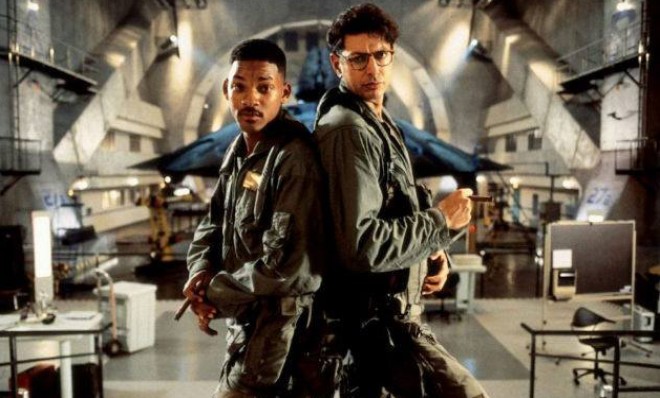What's going on with the Independence Day sequels?
It's taken nearly 20 years, but two Will Smith-less sequels to the popular sci-fi blockbuster are finally on the horizon


A free daily email with the biggest news stories of the day – and the best features from TheWeek.com
You are now subscribed
Your newsletter sign-up was successful
"We will not go quietly into the night! We will not vanish without a fight!" insists Bill Pullman in Independence Day, the rah-rah sci-fi blockbuster that blew up both the White House and the box-office in 1996. But unlike its characters, Independence Day performed a strange kind of vanishing act; ever since Will Smith, Bill Pullman, and company rallied and fought back their alien adversaries, the seemingly surefire franchise has remained curiously (and for Hollywood, uncharacteristically) silent.
Independence Day was the highest-grossing movie of 1996 by a considerable margin, earning more than $800 million in an era before inflated ticket prices. It remains the highest-grossing film in the careers of both director Roland Emmerich and star Will Smith, and many credit it with kicking off Smith's career as an A-List Hollywood actor. In this franchise-happy cinematic climate, how is it possible that we haven't had an Independence Day sequel?
As it turns out, it's not for lack of trying. Emmerich and his co-writer/producer Dean Devlin have been working on a sequel in some form or another for more than a decade, and their efforts have paid off: The duo are simultaneously working on two follow-ups optimistically titled ID Forever Part I and Part II. (Part I will reportedly hit theaters in 2015). In a 2002 interview, Devlin spoke about the difficulty of making an Independence Day sequel. "I like to think that hit movies are like a cocktail, you know?" he said. "You want to try to get all the ingredients back together again and try to get the same mix."
The Week
Escape your echo chamber. Get the facts behind the news, plus analysis from multiple perspectives.

Sign up for The Week's Free Newsletters
From our morning news briefing to a weekly Good News Newsletter, get the best of The Week delivered directly to your inbox.
From our morning news briefing to a weekly Good News Newsletter, get the best of The Week delivered directly to your inbox.
Unfortunately, that cocktail will be missing one of its primary components: Smith, who will not be reprising his starring role from the film. In 2009, Devlin told Latino Review that Fox wanted to make the sequels without Smith, deeming his reported $50 million salary too expensive. "Will is essential for us, for this movie and actually for the audience too," Devin insisted — but apparently not essential enough to keep the sequels from being produced without him.
While it's a fairly safe bet that ID Forever will be about aliens, both Emmerich and Devlin have been coy about the films' plot lines. In 2002, Devlin described a sequel, inspired by the 9/11 terrorist attacks, that would focus on "how the world came together in the aftermath" of the Independence Day invasion. In March, Emmerich said the sequel would focus on the stepson of Will Smith's character, who will square off against the aliens after they reemerge from a wormhole. Jeff Goldblum and Bill Pullman are both slated to return in supporting roles, and Emmerich is still holding out hope that he can convince Smith to show up for a cameo.
Which leaves one key question: Do audiences actually care about Independence Day anymore? A planned re-release of Independence Day in 3D might have helped audiences remember why they liked the movie in the first place — and introduced it to a whole new audience — but 20th Century Fox scrapped those plans late last year. In Hollywood, 19 years is a staggeringly long gap between a film and its sequel, and the interim has seen Emmerich relentlessly peddling his "more is more" blockbuster shtick in movies like Godzilla, The Day After Tomorrow, 2012, and last week's White House Down — a film that has turned out to be a major financial disappointment. (Especially for a director whose all-time most recognizable scene hinged on blowing up the White House.)
"Today we celebrate our Independence Day!" finishes Bill Pullman in the speech that gives Independence Day its name. The burgeoning franchise's path to inevitable sequel-hood has been longer and stranger than the average blockbuster, but it sounds like we'll actually, finally be welcoming the sequels to Earth in the near future — if audiences still care enough about Independence Day to celebrate it.
A free daily email with the biggest news stories of the day – and the best features from TheWeek.com
Scott Meslow is the entertainment editor for TheWeek.com. He has written about film and television at publications including The Atlantic, POLITICO Magazine, and Vulture.
-
 Crisis in Cuba: a ‘golden opportunity’ for Washington?
Crisis in Cuba: a ‘golden opportunity’ for Washington?Talking Point The Trump administration is applying the pressure, and with Latin America swinging to the right, Havana is becoming more ‘politically isolated’
-
 5 thoroughly redacted cartoons about Pam Bondi protecting predators
5 thoroughly redacted cartoons about Pam Bondi protecting predatorsCartoons Artists take on the real victim, types of protection, and more
-
 Palestine Action and the trouble with defining terrorism
Palestine Action and the trouble with defining terrorismIn the Spotlight The issues with proscribing the group ‘became apparent as soon as the police began putting it into practice’
